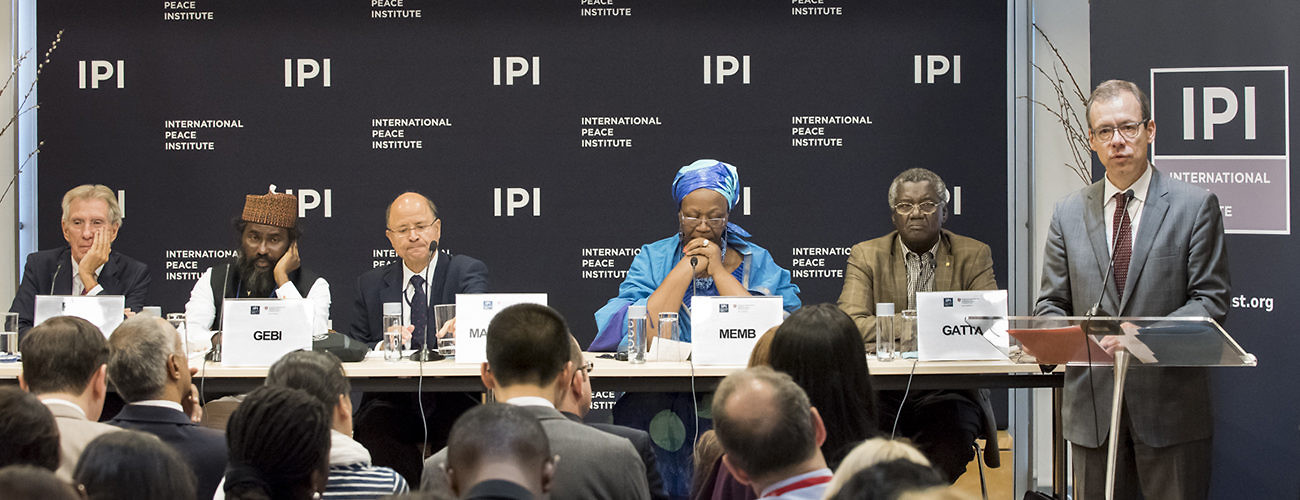IPI and the Federal Department of Foreign Affairs (FDFA) of Switzerland co-sponsored a policy forum on September 22, 2017 to share and discuss the conclusions and recommendations of the second regional conversation on “Investing in Peace and Prevention in the Sahel-Sahara” held in N’Djamena, Chad four months ago.
That meeting, which addressed the nature of violent extremism in the region as perceived by those directly affected by it (main conclusions here), had followed the first one, in Dakar in June, 2016, and a precursor seminar in Tunis in November, 2015.
This latest discussion featured a panel of participants from the N’Djamena talks, one of whom, Jean-Daniel Biéler, Special Adviser for Central Africa, Human Security Division of the FDFA, acknowledged that violent extremism in the Sahel had not diminished since the Dakar meeting 15 months ago but asserted that he now saw “a lot of advances that are important for our understanding of what could be a preventative approach.”
“We have seen that there is no specific profile for a violent person,” he said, “but there is a profile of the groups who use violence to get to their goals, and they will use all cracks and gaps in our social structure to get through.”
To forestall that, he said, “we need to re-anchor our own political values where we are practicing them–from representative elections, to access to political expression, to environmental preservation. Communities, NGOs, and states have to take our responsibilities and open the door for dialogue wherever it is.”
Olivier Zehnder, Switzerland’s Deputy Permanent Representative to the United Nations, said the N’Djamena talks had shown that “there are more and more voices that want to gain in preventing violence. The main thing that comes out of these conversations is that we have to speak, and to speak, we have to meet.”
Steven Siqueira, Deputy Director of the UN Office of Counterterrorism, said that while it had become clear that “harsh crackdowns and heavy handed approaches can be counterproductive,” more emphasis needed to be put on developing alternative approaches. “We’ll only succeed in addressing the increasingly transnational threat of terrorism if we develop a new and comprehensive agenda for multilateral cooperation with a focus on prevention,” he said.
Specifically, he said, “the international community must do more to address the roots of radicalization including real and perceived injustices, high levels of unemployment, and grievances among young people.”
Involving women directly in negotiating for peace and preventing violence was the fervently uttered demand of Madeleine Memb, journalist and representative of MediaWomen4Peace in Cameroon. The fact that women in the region are burdened by living with debilitating personal loss and in real distress does not inhibit their ability to make a meaningful contribution, but quite the opposite, she argued.
By way of example, she said, “We questioned a woman who saw her child beheaded in front of her, and she said, ‘What I am looking for is that women need to be supported.’”
“Can women play a role in investment policy?” she asked. “I say, ‘Yes.’ At the high level, understand feminist existence, women participating actively in decision-making levels, to orient policy to take into account what they are seeing, what they are living.”
Asserting that when women go into politics, policies become more effective, she contended, “It’s time now that we give women the means, which, contrary to what you might think, is not a question of material means, but it’s psychological solutions, answers, words to reflect on their suffering, to try to understand what’s happening to them, to try to understand why their child is being radicalized.”
Aliyu Gebi, Senior Special Adviser of the Nigerian Ministry of Interior, said that though his region suffered from “weaponized poverty, layered with weaponized religion and weaponized politics,” he believed peace was still possible if organized society adjusted itself to the “reality on the ground.”
He defined peace as “the ability to allow my children to go outside and play, to go to the mosque, park, market, movies, to come back home without my worrying about where they are. Peace means mothers allowed to be mothers, fathers to be fathers, and children to be children,” he said. But he warned, “At any point in time that this balance is disturbed, there will be problems in society.”
An optimistic note was sounded by Gali Ngothé Gatta, parliament member from Chad. “The Lake Chad region is being rebuilt even though a few Boko Haram fighters are sowing death and destruction,” he said. “The first sign of progress I observed in Chad was the actors associating themselves together to help communities reorient themselves.”
Among them, he identified agricultural workers, religious leaders, women’s organizations, local politicians, members of civil society, and the international community including NGOs, the European Union and the UN.
He concluded: “The state had a monopoly on the debate, but now it’s an open debate, discussing what is going on, why they are mobilizing young children in violence.”
Youssef Mahmoud, IPI Senior Adviser, moderated the discussion.








